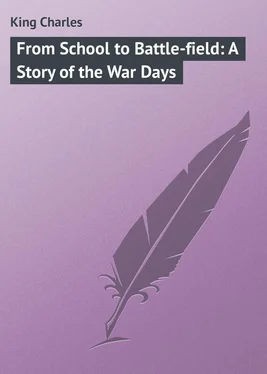Charles King - From School to Battle-field - A Story of the War Days
Здесь есть возможность читать онлайн «Charles King - From School to Battle-field - A Story of the War Days» — ознакомительный отрывок электронной книги совершенно бесплатно, а после прочтения отрывка купить полную версию. В некоторых случаях можно слушать аудио, скачать через торрент в формате fb2 и присутствует краткое содержание. Жанр: foreign_prose, foreign_children, на английском языке. Описание произведения, (предисловие) а так же отзывы посетителей доступны на портале библиотеки ЛибКат.
- Название:From School to Battle-field: A Story of the War Days
- Автор:
- Жанр:
- Год:неизвестен
- ISBN:нет данных
- Рейтинг книги:3 / 5. Голосов: 1
-
Избранное:Добавить в избранное
- Отзывы:
-
Ваша оценка:
- 60
- 1
- 2
- 3
- 4
- 5
From School to Battle-field: A Story of the War Days: краткое содержание, описание и аннотация
Предлагаем к чтению аннотацию, описание, краткое содержание или предисловие (зависит от того, что написал сам автор книги «From School to Battle-field: A Story of the War Days»). Если вы не нашли необходимую информацию о книге — напишите в комментариях, мы постараемся отыскать её.
From School to Battle-field: A Story of the War Days — читать онлайн ознакомительный отрывок
Ниже представлен текст книги, разбитый по страницам. Система сохранения места последней прочитанной страницы, позволяет с удобством читать онлайн бесплатно книгу «From School to Battle-field: A Story of the War Days», без необходимости каждый раз заново искать на чём Вы остановились. Поставьте закладку, и сможете в любой момент перейти на страницу, на которой закончили чтение.
Интервал:
Закладка:
"Go on with the recitation, Mr. Beach," he says. "That Italian was doubtless hired by these young gentlemen. Let them dance to their own music now, the eloquent Bliss in the lead. Go on with your lines, Bliss."
And as this is just what Bliss can't do, Bliss is promptly "flunked" and sent to the foot, where Hoover grins sardonically. He's ahead of one fellow anyhow. Just so long now as that organ-grinder does must Halsey stay – and supervise, and scorch even the best scholars in the class, for well he knows the First Latin and they him, and their respect for him is deeper than his for them, despite the known fact that Pop himself looks upon them with more than partial eyes. The class is getting the worst of it when in comes an opportune small boy. "Mr. Meeker says will Mr. Halsey please step into the Fourth Latin room a minute," and Halsey has to go.
"If those young gentlemen give you any trouble, Mr. Beach, keep the whole class in at recess," he says, and thereupon, with eyes of saddest reproach, the class follows him to the door, as though to say, How can such injustice live in mind so noble? But the moment Halsey vanishes the gloom goes with him. Beach's eyes are on the boys at the foot of the class, and with a batter and bang the Japan tray on the Doctor's desk comes settling to the floor, while Joy, who dislodged it, looks straight into the master's startled eyes with a gaze in which conscious innocence, earnest appeal, utter disapprobation of such silly pranks, all are pictured. Joy can whip the bell out from under the master's nose and over the master's table and all the time look imploringly into the master's eyes, as though to say, "Just heaven! do you believe me capable of such disrespect as that?" Three boys precipitate themselves upon the precious waiter, eager to restore it to its place, and bang their heads together in the effort. Five marks off for Shorty, Snipe, and Post. Bagshot is on the floor, and announces as the sense of the First Latin that a boy who would do such a thing should be expelled. Mr. Beach says the First Latin hasn't any sense to speak of, and tells Bagshot to begin where he left off. Bagshot thereupon declares he can't remember. It's getting near the "business end" of the hour, and the whole class has to look to its marks, so it can't all be fun. Thereupon Beach, who is nothing if not classical, refers to Bagshot's lack of acquaintance with the Goddess of Memory. "Who was she, Bagshot?" "Mnemosyne." "Very good; yes, sir." ("Thought it was Bacchante!" shouts little Beekman. "No, sir. Five marks off, Beekman. No more from you, sir.") "Now, Bagshot, you should be higher than ten in your class to-day, and would be but for misbehavior. What was the color of Mnemosyne's hair?" Bagshot glares about him irresolute, and tries the doctrine of probability.
"Red!"
Beach compresses his lips. "M – n – no. That hardly describes it. Next."
"Carnation," hazards Van Kleeck.
"Next! Next! Next!" says Beach, indicating with his pencil one after another of the eager rank of boys, and, first one at a time and distinctly, then in confused tumbling over each other's syllables, the wiseacres of the class shout their various guesses.
"Vermilion!"
"Scarlet!"
"Carrot color!"
"Solferino!"
"Magenta!"
"Pea-green!"
"Sky-blue!"
"Brick-red!" (This last from Turner, who makes a bolt for a place above Bagshot, and can only be driven back and convinced of the inadequacy of his answer by liberal cuttings of ten to twenty marks.) Then, at last, Beach turns to Carey, at the far head of the class, and that gifted young gentleman drawls, —
"Fl-a-a-me color."
"Right!" says the master, whereupon half a dozen contestants from below spring to their feet, with indignation in their eyes:
"Well, what did I say, sir?"
"That's exactly what I meant, sir."
"I'll leave it to Bliss if that wasn't my answer, sir."
And nothing but the reappearance of Othello puts an end to the clamor and settles the claimants. Shorty submits that his answer covered the case, that Mnemosyne herself couldn't tell carrot color from flame, and is sure the Doctor would declare his answer right, but is summarily squelched by Mr. Halsey, and he has the " nous " to make no reference to the matter when the Doctor comes. The hour is nearly over. Only three minutes are allowed them in which to stow their Virgils in the big open bookcase and extract their algebras. Halsey vanishes to see to it that the Third Latin goes to the writing-room without mobbing the Fourth. The marks of the First are recorded, not without a volume of comment and chaff and protest. Then silence settles down as the master begins giving out the next day's lesson, for the word has been passed along the line of benches, "Get ready for a charge!" A moment later the janitor sounds the bell on the landing without, and twenty-six young fellows spring into air and rush for the bookcase. Not a word is spoken, – Hoover, alone, holds aloof, – but in less time than it takes to tell it, with solemnity on every face except one or two that will bubble over in excess of joy, the First Latin is jammed in a scrimmage such as one sees nowadays only on the football field. The whole living mass heaves against those stout partitions till they bend and crack. From the straining, struggling crew there rises the same moaning sound, swelling into roar and dying away into murmur, and at last the lustier fight their way out, algebras in hand, and within another five minutes order is apparently evolved from chaos.
In such a turmoil and in such a charge Joy's watch disappeared that October day, and the school had not stopped talking of it yet.
It has been said that two boys were the observed of gloomy eyes the Monday following Snipe's misfortune. One, Hoover, of course. The other a fellow who in turn had sought to be everybody's chum and had ended by being nobody's. His name was Briggs. He was a big, powerful fellow, freckle-faced, sandy-haired, and gifted with illimitable effrontery. He was a boy no one liked and no one could snub, for Briggs had a skin as thick as the sole of a school-boy's boot, and needed it. One circumstance after another during the previous year had turned one boy after another from him, but Briggs kept up every appearance of cordial relations, even with those who cold-shouldered him and would have naught to do with him. During the previous school-year he had several times followed Snipe, Shorty, and their particular set, only to find that they would scatter sooner than have him one of the party. He had been denied admission to the houses of most of the class. He had been twice blackballed by the Uncas, and it was said by many of the school when Briggs began to consort with Hoover that he had at last found his proper level. One allegation at his expense the previous year had been that he was frequently seen at billiard-rooms or on the streets with those two Hulkers, and even Hoover had hitherto eschewed that association. Perhaps at first the Hulkers would not have Hoover. The class couldn't tell and really didn't care to know. One thing was certain: within the fortnight preceding the opening of this story Briggs and Hoover had been together more than a little and with the Hulkers more than enough.
"Are you sure of what you say?" both Carey and Joy had asked Shorty that exciting Monday morning, as the eager youngster detailed for the tenth time the incidents of the assault on Snipe.
"I'm as sure of it as I am of the fire," said Shorty, positively. "Jim Briggs was with the Metamora crowd, running in the street. He looked back and laughed after he saw Snipe down."
But when confronted with this statement by the elders of the "Sacred Band" Briggs promptly and indignantly denied it.
"I never heard of it till to-day!" said he. "'Spose I'd stand by and see one of my class knocked endwise by a lot of roughs? No , sir!"
Читать дальшеИнтервал:
Закладка:
Похожие книги на «From School to Battle-field: A Story of the War Days»
Представляем Вашему вниманию похожие книги на «From School to Battle-field: A Story of the War Days» списком для выбора. Мы отобрали схожую по названию и смыслу литературу в надежде предоставить читателям больше вариантов отыскать новые, интересные, ещё непрочитанные произведения.
Обсуждение, отзывы о книге «From School to Battle-field: A Story of the War Days» и просто собственные мнения читателей. Оставьте ваши комментарии, напишите, что Вы думаете о произведении, его смысле или главных героях. Укажите что конкретно понравилось, а что нет, и почему Вы так считаете.












